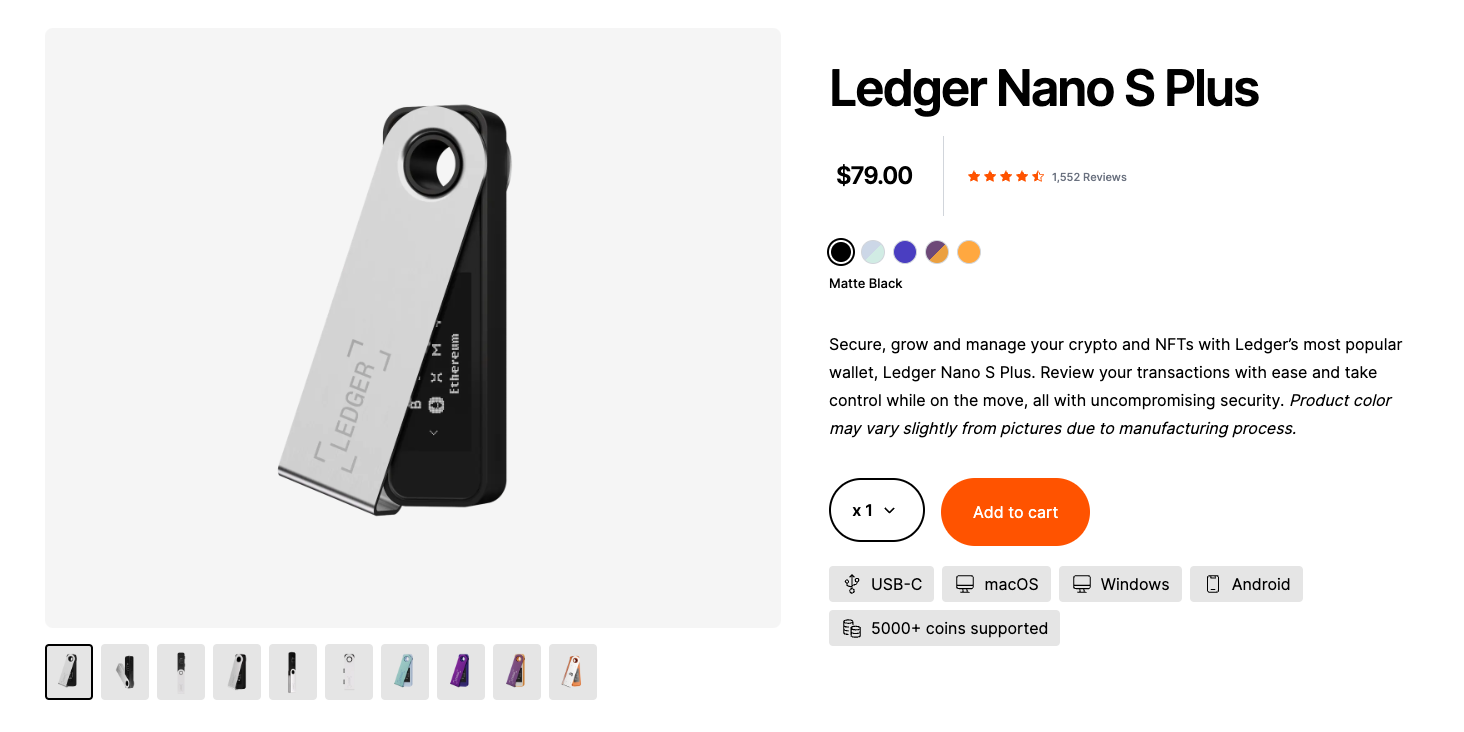
Ledger Wallet is one of the top-rated cryptocurrency wallet options available.
If you own cryptocurrency, it’s essential to keep it stored somewhere safe from hacking and accidental loss.
One of the best ways to do that is with a hardware wallet that takes your cryptocurrency entirely offline, known as cold storage.
Among hardware wallet companies for cryptocurrency, Ledger is a market leader behind two of the most popular cold storage wallets available today.
Ledger Details | |
|---|---|
Product Name | Ledger Nano S Plus And Nano X |
Product Type | Hardware Crypto Wallet |
Price | $79 to $279 |
Supported Assets | 1,800+ Coins and Tokens |
Promotions | None |
Pros And Cons
What Is A Cryptocurrency Hardware Wallet?
Cryptocurrency hardware wallets are physical devices that store cryptocurrency wallet addresses and keys securely. That way you’re able to keep your coins offline. By using a secure wallet, your currency is kept almost entirely out of reach of hackers.
When you keep your currency at a big exchange like Coinbase or Binance, meanwhile, you’re trusting the exchange to store your currency on your behalf safely. You’re most likely safe when using a large exchange like this. But there are horror stories of exchanges going bust due to mysteriously vanishing founders and other questionable circumstances. So it’s important to choose where to store your currency carefully.
To protect yourself, you can use an external cryptocurrency wallet of your own. Arguably, the most secure are hardware wallets, like those made by Ledger. As long as you keep that device, your PIN, password, and seed phrase recovery information safe, your currency should be safe from thieves.
It should be noted, however, that Ledger did suffer a security breach in July 2020 that exposed the personal information (such as phone numbers and personal addresses) of over 270,000 customers. Private keys weren't exposed, but still this isn't a great look for a company that's entire business model is built on security. Also, ever since the leak, the victims have been the targets of a myriad of phishing scams.
In 2023, Ledger got into some hot water with their userbase by attempting to launch a new feature that allowed private keys to be stored on their servers (split up to different companies and encrypted, but still...). In the face of the backlash, they've pulled back the idea and agreed to open-source more of their code. However, many users have sought alternatives.
Ledger Hardware Wallets
Ledger is one of the best-known and biggest hardware wallet makers in the cryptocurrency space. Ledger wallets are relatively affordable and easy to use. The lower-cost wallet is my top pick as the best hardware wallet for the price point.
Ledger Nano S Plus
The Ledger Nano S hardware wallet costs $79 and might be the best hardware wallet you can find under $100. Nano S is highly secure and relatively easy to use. It supports over 1,800 coins and tokens in conjunction with the Ledger Live software, available for free to wallet owners.
Nano S uses a simple two-button interface that’s beginner-friendly and secure enough for experts. You can only work with a few currencies at a time through Ledger apps. But it can store as many coins as you want long-term. It plugs into your computer or other device using USB.
Ledger Nano X
Nano X is the upgraded version with a bigger screen and more advanced features. It supports Bluetooth (note: some might consider that a negative in regards to security) as well as USB connections and has a battery for use when not physically plugged in. The larger storage works with up to 100 apps at a time, far more than Nano S can handle.

Nano X uses the same Leder Live software and holds the same list of 1,800+ assets as the Nano S. The Ledger Nano X is available for $149.
A personal note on Ledger Nano X wallets from the author: Ledger provided me with a free Nano S and Nano X for testing purposes. My Nano S works great, and I’m still using it actively today. However, the Nano X no longer connects to my computer or smartphone with a wired or wireless connection, even with several hard resets. I reached out to customer service and never got a response. However, any currency stored on a Ledger wallet is recoverable using the seed phrase generated during setup, even if lost, broken, or stolen.
Ledger Stax
Ledger Stax is their newest product, but it's currently on a waitlist to receive the physical product. While it operates like their other products (securely storing the seed phrase), the Stax has a full screen that allows you to see your transactions before you sign. The screen will also be able to show your favorite NFT. We will test it more once we get a a physical product.
How To Use A Ledger Wallet To Store Cryptocurrency
Using a Ledger wallet with Ledger Live (available for Windows, Mac, Android, iOS, and Linux devices) is straightforward if you’re comfortable using a computer. Here’s what you can do:
- Securely store cryptocurrency: The most important feature of Ledger is storing your currency in offline cold storage. Assuming you followed the recommended setup instructions, it's stored using your device with maximum security.
- Send and receive currency: All cryptocurrency wallets have both a public address and private keys. Ledger Live and Ledger wallets give you access to your public address to receive currency. It stores your keys so you can easily send to any outside wallet using Ledger Live.
- Swap currencies: Ledger Live integrates with an external exchange, which you can use to buy, sell, and swap currencies directly from your Ledger device. It’s not always the cheapest option, though, so watch out for fees if you swap using Ledger partners.
- Using Dapps: Ledger Live directly integrates with several Dapps (decentralized applications) and services. These include additional exchanges and staking services to earn interest from your currency. Additional apps are listed as coming soon in so the ecosystem is likely to grow in the future.
Ledger devices are compatible with some outside software wallets as well, giving the device plenty of flexibility to use how you want. But Ledger Live is the most user-friendly way to use the wallet.
Customer Support
The worst part about Ledger wallets is customer support. When I had trouble with a Ledger Nano X hardware wallet, I emailed customer support and didn’t hear anything back for months. I was shocked after that time to hear anything at all.
It was a generic email saying they were sorry about the long wait and if I still needed help to reply. I responded and never heard back again. If you have trouble with a Ledger wallet, consider yourself on your own for technical support.
Ledger Alternatives
Ledger is one of the most popular hardware wallets, but here a couple of noteworthy competitors worth considering:
- Trezor: Trezor, another hardware wallet is probably Ledger’s top competitor. Trezor also makes two wallets with a focus on security and ease of use.
- Exodus: Exodus is a free software wallet. It's often a bit less secure than hardware wallets as the software will likely be downloaded on a device that’s frequently connected to the internet. But it’s a good way to get a better understanding of cryptocurrency wallets without spending money on a device.
Check out this table for a quick look at how Ledger compares:
Header |  |  |  |
|---|---|---|---|
Price Of Device Or Software | $79 to $249 | $63 to $195 | Free |
Wallet Type | Hardware | Hardware | Software |
Supported Assets | 1,000+ Coins and Tokens | 1,600+ Coins And Tokens | 145+ Coins and Tokens |
Integrated Exchange | |||
Cell |
Is Ledger Right For You?
Ledger is a popular hardware wallet for a good reason. Wide compatibility, easy use, robust security, and a reasonable price tag combine to make Ledger a top choice for keeping your Bitcoin, Ethereum, and other cryptocurrencies safe and secure in cold storage.
While I had an issue with one demo device and never got any help from customer service, I still find the Ledger experience to be a good one overall. If you’re comfortable with computers and want a safe place to store your cryptocurrency, a Ledger wallet is certainly worth considering.
Ledger Features
Product Type | Hardware Crypto Wallet |
Price |
|
Supported Assets | 1,800+ Coins And Tokens |
Integrated Exchange | Yes, Ledger Live |
Automatic Device Reset | Yes, after three incorrect PINs are entered |
Biometric Logins | Yes, fingerprint and face scanning on Ledger Live Mobile |
Staking | Yes, in Ledger Live, you can directly stake:
|
Lending | Yes, you can lend USDC, DAI, and USDT through Ledger Live with Compound. |
Transaction Fees (In Ledger Live) | Vary based on the transaction speed that you choose |
Bluetooth Compatability |
|
MicroSD Slot | No |
Backup | 24-word recovery phrase |
Connector |
|
Battery |
|
Third-Party Wallet Compatability | 50+ wallets |
Ledger Live Mobile App Availability | Android and iOS |
Ledger Live Desktop Availability | Yes, on Windows 8.1+, macOS 10.14+, and Linux computers |
Customer Support Options | Contact form and a helpdesk FAQ |
Promotions | None |

Eric Rosenberg is a financial writer, speaker, and consultant based in Ventura, California. He holds an undergraduate finance degree from the University of Colorado and an MBA in finance from the University of Denver. After working as a bank manager and then nearly a decade in corporate finance and accounting, Eric left the corporate world for full-time online self-employment. His work has been featured in online publications including Business Insider, Nerdwallet, Investopedia, The Balance, HuffPo, Investor Junkie, and other fine financial blogs and publications. When away from the computer, he enjoys spending time with his wife and three children, traveling the world, and tinkering with technology. Connect with him and learn more at EricRosenberg.com.

